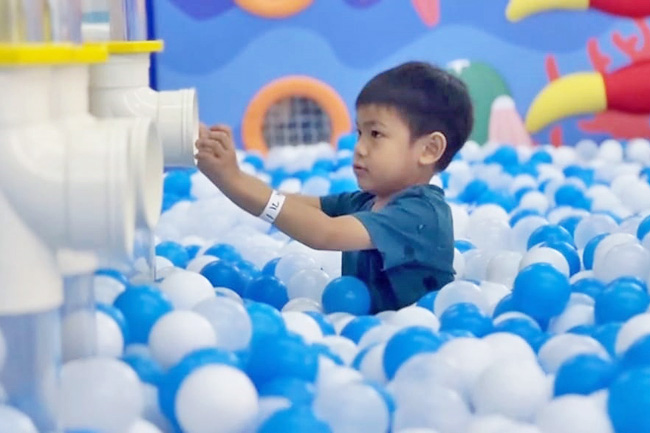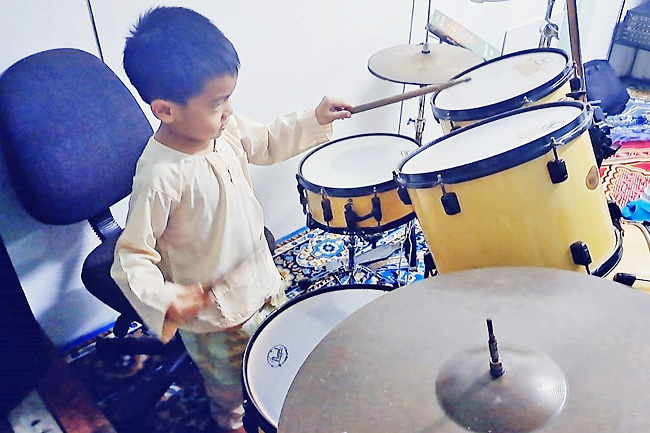As time marches on, the spotlight on autism continues to broaden its reach. Often referred to as autism spectrum disorder (ASD), autism is a neurodevelopmental condition renowned for its intricate tapestry of challenges, encompassing difficulties in social interactions, repetitive behaviours, and communication hurdles.
This broad spectrum nature stems from the diverse and nuanced ways it manifests in individuals, showcasing a range of impacts and intensities.
While some individuals with autism may exhibit exceptional talents in specific domains, others grapple with significant hurdles in daily activities.
Typically diagnosed in early childhood, autism necessitates interventions such as therapy and tailored educational support to empower affected individuals to navigate life with fulfilment and independence.
To gain insight into the experience of navigating life with an autistic child, particularly during the Hari Raya Aidilfitri festivities, the Bulletin reached out to Mazlina, a devoted mother to Muhammad Abdel Wakeel, lovingly referred to as Wakeel, who was diagnosed with autism at the tender age of three.
From mitigating meltdowns triggered by sensory sensitivities to navigating social engagements with meticulous care, Mazlina’s narrative serves as a demonstration to parental devotion and unwavering advocacy.


CROWD COMFORT
According to Mazlina, Wakeel isn’t hyperactive, and she’s adept at managing his behaviour, even though he occasionally experiences meltdowns when upset.
Mazlina shared the intricacies of navigating social events like Hari Raya open houses, where balancing Wakeel’s comfort with societal expectations becomes a delicate dance. She described their efforts to create a safe haven for Wakeel in unfamiliar settings, where his curiosity often led to exploration but sometimes triggered overwhelming meltdowns.
When attending such events, Mazlina explained they typically don’t stay long because Wakeel enjoys roaming around and exploring his surroundings. To prevent him from touching fragile items, Wakeel’s dad accompanies him, providing distractions like his favourite food to keep him engaged.
“There are times when the situation becomes too noisy for Wakeel, triggering meltdowns,” Mazlina said.
“During these moments, Wakeel’s father calms him down and takes him to sit in the car to escape the cacophony. Wakeel is extremely sensitive to loud sounds and crowded, confined spaces.
“If we find ourselves in a crowded area,” she continued, “we’ll take him outside or to a quieter space where he can relax and feel at ease”.
Additionally, they’ve learned to recognise and address his sensitivity to loud sounds by allowing him to wear a headset, as advised by his therapist.
Mazlina emphasised that only those familiar with autism or raising a child with autism can truly comprehend the challenges faced as parents in soothing and managing their children to prevent any disruptions to others attending the events.
“In most cases, the places we visit are understanding, but sometimes we need to explain to the hosts that our stay will be brief, ensuring everyone’s comfort”.
She added when visiting places or houses familiar to her son, he would confidently enter without hesitation.
However, new environments would take some time for him to adjust to.
She shared that Wakeel’s meltdowns are typically short-lived, lasting about 10 minutes.
These episodes usually occur when he’s in new and intriguing places, requiring time for him to adapt.
During meltdowns, Mazlina explained that she and her husband employ strategies like providing Wakeel’s favourite foods as a calming mechanism.
Usually, he stops crying and becomes fine. However, if the situation persists, he’ll either urge Mazlina or his father to leave or accompany him outside.
Understanding their behavioural patterns is crucial, Mazlina stressed, underscoring the importance of accommodating Wakeel’s sensory sensitivities.
She also emphasised the importance of recognising the challenges faced by parents of children with autism, noting that sometimes people may not realise a child is autistic because they may appear just like any other child.
“If you notice parents struggling to calm their autistic child, consider offering support or understanding if they need to leave the place or house,” Mazlina suggested.
“At the same time, refrain from making quick judgements about the parents or the appearance of the children, particularly during festive occasions when circumstances may prevent their attendance. The key is to support one another and empathise with the challenges faced by these parents.”
SPECTRUM DIVERSITY
Speaking of challenges, Mazlina highlighted the misconceptions surrounding tantrums or meltdowns in autistic children, noting that they’re often labelled as naughty.
However, she emphasised that not all autistic children exhibit the same behaviour – some may be quiet, while others may be hyperactive or withdrawn.
It’s particularly upsetting when people blame parents for their children’s behaviour, assuming they haven’t taught them manners or are being irresponsible.
Navigating mild autism in children requires a deeper understanding, especially since it may not be immediately apparent to outsiders. Recognising the signs and distinguishing mild autism from typical behaviour is essential, as misconceptions often prevail.
It’s important to debunk myths surrounding autism, such as associating it solely with physical disabilities or hyperactivity.
Despite the challenges, Mazlina stressed the significance of recognising and embracing children with autism, advocating for their needs, and offering them unwavering support and understanding.
With patience, education, and resilience, she aims to overcome obstacles and pave a promising path forward for her son. – Rokiah Mahmud



















































